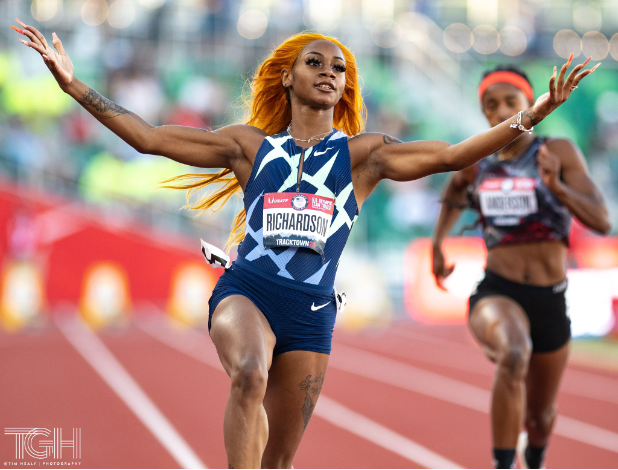Sha’Carri Richardson’s Journey to 2021 Tokyo Olympics Derailed by Positive Drug Test
At the 2021 U.S. Olympic track and field trials, standout sprinter Sha’Carri Richardson tested positive for THC and was forced to put her Olympic dreams on hold. Since then, Americans across the country have questioned the legitimacy of the U.S. Anti-Doping Agency’s position on marijuana use.
By Isaiah Shiau
Sha’Carri Richardson punched her ticket to the Tokyo Olympic Games by placing first in the 100-meter final at the U.S. Olympic track and field trials in Eugene, Oregon on June 19, 2021.
Crossing the finish line in a blazing 10.86 seconds, Richardson raised her arms in celebration. It was an uplifting moment for the 21-year-old, who had lost her biological mother a week before the race.
Sha’Carri Richardson crosses the finish line in first place in the 100-meter dash at the U.S. Olympic Trials. Photo by Timothy Healy/@TGH_PDX_photos
But the joy did not last. Her dreams of being an Olympian were crushed after a positive drug test found traces of THC in her system.
Richardson received a one-month suspension from the U.S. Anti-Doping Agency, or USADA, which prevented her from competing in the 100-meter dash at the summer Olympics. This upset many fans, who felt the suspension was unjustified since marijuana use is not generally believed to have performance enhancing effects. After the news of Richardson’s suspension was released, thousands of supporters, including many top athletes, rallied on social media to speak out against the USADA decision.
Patrick Mahomes, quarterback for the Kansas City Chiefs, weighed in on Twitter, saying, “This is so trash man… just let her run!”
Marijuana advocates also criticize Richardson’s suspension as unjust, citing local laws in Oregon — which permit recreational marijuana use — and the rising support nationally for marijuana decriminalization.
“Sha’Carri Richardson consumed cannabis in the legal adult-use market of Oregon for reasons unrelated to performance — and yet she still suffers at the hands of the outdated policies of the U.S.A Track & Field and USADA,” says Steven Hawkins, CEO and founding member of the United States Cannabis Council.
Sha’Carri Richardson points to the clock as she places first in the 100-meter semifinals in a wind-aided time of 10.64. Photo by Timothy Healy/@TGH_PDX_photos
Still, fans and supporters say the rules should be changed to exempt marijuana as a prohibited substance. They feel it is confusing and unfair that Richardson was punished for consuming marijuana in Oregon, a state in which recreational marijuana use has been legal for adults ages 21 and older since July 2016.
“Inconsistencies (in marijuana regulation) force people to be stuck in the middle, navigating unclear rules and being faced with lifelong consequences,” says Matt Sutton, spokesperson for the Drug Policy Alliance, a nonprofit that advocates for polices “that best reduce the harms of both drug use and drug prohibition.”
Although the USADA acknowledges that marijuana use is legal in some states, it explains that its regulations still apply to athletes competing in those states. “Marijuana is prohibited in-competition by the World Anti-Doping Agency, and this status applies to all athletes regardless of the state laws where they live,” the organization says on its website.
Sha’Carri Richardson receives a first-place medal in the women’s 100-meter dash. Photo by Timothy Healy/@TGH_PDX_photos
Erik Altieri, executive director of the National Organization for the Reform of Marijuana Laws, feels that the USADA’s stance on marijuana is outdated and sympathizes with Richardson.
“At a time when marijuana use is legally accepted in a growing number of U.S. states and around the world, it makes exactly zero sense for regulators to continue to take punitive actions against athletes like Sha’Carri Richardson or anyone else who chooses to consume cannabis in their off-hours,” Altieri argues.




